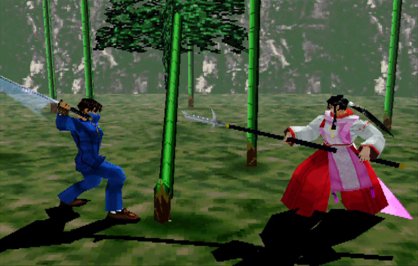I was recently hanging out with my friend Mike having some drinks, watching some movie (The Raid is amazing seriously go see it) and playing some games. Of course while doing this we were chatting about various things – mostly games – and we turned to stuff from back in the day that we liked, as us old-timers are prone to doing.
Something we both agreed on though was that for all the newfangled graphics and physics engines, and for all the gun games of recent years, gaming seemed poised to go down a particular path and then swerved violently away from it. Probably the best example of this path is Bushido Blade, a fighting game where you choose your character, weapon (such as the Ancient Hanzo Sledgehammer), and have at it. Thing is there are no health bars; you take swings, they take swings, and you might get one-hit killed or cripple their leg or all sorts of things. It’s ropey, because it’s an old game that never had a huge budget to begin with, but it’s honestly one of the best fighting games ever.
You know in Samurai movies when the two dudes stand facing each other for a long, long time before making a single sudden attack that decides things? Bushido Blade is the only game I’ve played where that can happen. You and your friend will be sitting there watching, circling each other, trying to feel each other out, and then there’ll be a sudden burst of violence that decides the round. It’s brilliant – and even by the time the second game came out it was abandoned in favor of health bars and too-crazy characters and so on and so forth. It was a shame, though the original is still worth popping in if you’ve got a copy.

But it’s emblematic of a rather broader trend – namely, the reduction in experimentation over the years. Now to be fair this is picking back up a bit again, as indie games gain more and more ways to reach people, as kickstarters let people choose the sorts of things they want to see, and as publishers see the success of games they might not typically consider salable, such as S.T.A.L.K.E.R. Still, in this day and age you’d think we’d have developed depth that built on the sorts of ideas Bushido Blade seeded – locational damage in a fighter for instance. Or look at the game Sentinel, which had a very ambitious conversational system where you could actually ask NPCs things in a free-form manner. Underdeveloped and ropey, again, but a thing with so much potential. Instead we get yet another Soul Calibur, yet another Tekken, yet another Call of Duty. Nothing wrong with those in their own right, just sad to see there’s so little experimentation and attempts to use computing power for anything other than better graphics.

On the money.
The reason they don’t do it is because they don’t need to. However many billion people still buy Call of Duty regardless of what they do with it. Innovation risks alienating people who just want to do the same thing they did in the last game, but newer. Really, the only reason these games are actually called new games is so they can charge full price for them. We’ve long since passed the point where a single game can just be updated and improved ad infinitum [see: World of Warcraft].
I’ve seen a bit of speculation over whether the games industry is headed for another crash, as blatant shovelware becomes more and more prevalent and the potential for profit in the “AAA” side of the industry keeps shrinking. Guess we’ll just have to wait and see.
Yeah, sadly there’s little incentive to take big risks it seems.
I’m not sure whether there’s a full-blown 1983 replay on the cards, but I can definitely see a contraction as plausible. Then again we’re still buying the sequels and they’re getting bigger sales every time so… maybe not.
Have you ever played Overgrowth? While I admit that it isn’t truly a fighting game, but rather something more akin to a platformer/adventure, it does produce standoffs and instant death scenarios if you don’t pay attention to your opponents movement. I made myself a little stadium level for a fighting arena like experience. Its worth a shot.
I’ve not played Overgrowth, but I have played Lugaru, and I’ve been semi keeping up to date with Overgrowth through the YouTube dev vids. I agree it’s a very interesting game and that it does a lot of good things! Thanks for bringing it up as I had completely forgotten about it :D